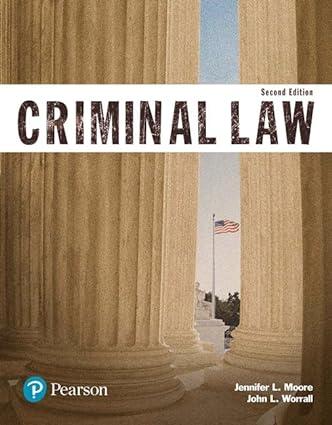In defendants appeal from his conviction for depraved indifference murder for the shooting death of a 13-year-old
Question:
In defendant’s appeal from his conviction for depraved indifference murder for the shooting death of a 13-year-old boy, the sole question we address is the legal sufficiency of the evidence. Defendant, a 15½-year-old high school student, deliberately loaded a mix of “live” and “dummy” shells at random into the magazine of a 12-gauge shotgun. He pumped a shell into the firing chamber not knowing whether it was a “dummy” or a “live” round. He raised the gun to his shoulder and pointed it directly at the victim, Darrin Seifert, who was standing approximately 10 feet away. As he did so, he exclaimed “Let’s play Polish roulette” and asked “Who is first?”. When he pulled the trigger, the gun discharged sending a “live” round into Darrin’s chest. Darrin died as a result of the massive injuries.
Defendant was convicted after a bench trial and the Appellate Division unanimously affirmed, holding that the evidence was legally sufficient to establish defendant’s guilt. On our review of the record, we conclude, as did the Appellate Division, that the proof is legally sufficient. Accordingly, there should be an affirmance.
. . . Before analyzing the evidence and its legal sufficiency, a brief examination of the crime of depraved indifference murder and its elements is instructive. Depraved indifference murder, like reckless manslaughter is a nonintentional homicide. It differs from manslaughter, however, in that it must be shown that the actor’s reckless conduct is imminently dangerous and presents a grave risk of death; in manslaughter, the conduct need only present the lesser “substantial risk” of death. Whether the lesser risk sufficient for manslaughter is elevated into the very substantial risk present in murder depends upon the wantonness of defendant’s acts—i.e., whether they were committed “[u]nder circumstances evincing a depraved indifference to human life” (Penal Law § 125.25[2]). This is not a mens rea element which focuses “upon the subjective intent of the defendant, as it is with intentional murder;” rather it involves “an objective assessment of the degree of risk presented by defendant’s reckless conduct.”
. . .Generally, the assessment of the objective circumstances evincing the actor’s “depraved indifference to human life”—i.e., those which elevate the risk to the gravity required for a murder conviction—is a qualitative judgment to be made by the trier of the facts. If there is evidence which supports the jury’s determination, it is this court’s obligation to uphold the verdict. Examples of conduct which have been held sufficient to justify a jury’s finding of depraved indifference include: driving an automobile on a city sidewalk at excessive speeds and striking a pedestrian without applying the brakes; firing several bullets into a house; continually beating an infant over a five-day period; and playing “Russian roulette” with one “live” shell in a six-cylinder gun.
With this background, we turn to the issue before us, now more fully stated: whether, viewing the evidence in the light most favorable to the People, any rational trier of the fact could have concluded that the objective circumstances surrounding defendant’s reckless conduct so elevated the gravity of the risk created as to evince the depraved indifference to human life necessary to sustain the murder conviction. A brief summary of the evidence is necessary.
. . . The evidence of the objective circumstances surrounding defendant’s point-blank discharge of the shotgun is, in our view, sufficient to support a finding of the very serious risk of death required for depraved indifference murder. Because the escalating factor—depraved indifference to human life—is based on an objective assessment of the circumstances surrounding the act of shooting and not the mens rea of the actor, the evidence stressed by the dissent concerning defendant’s mens rea—his emotional condition in the aftermath of the killing is beside the point.
Questions:
1. What elements are necessary to convict the defendant of depraved heart murder?
2. The court engages in a significant discussion of the mens rea requirement for depraved heart murder. Is the test subjective or objective? Explain.
3. The defendant in this case is 15 years old. Should he be treated differently because of his age? Why or why not?
Step by Step Answer:






